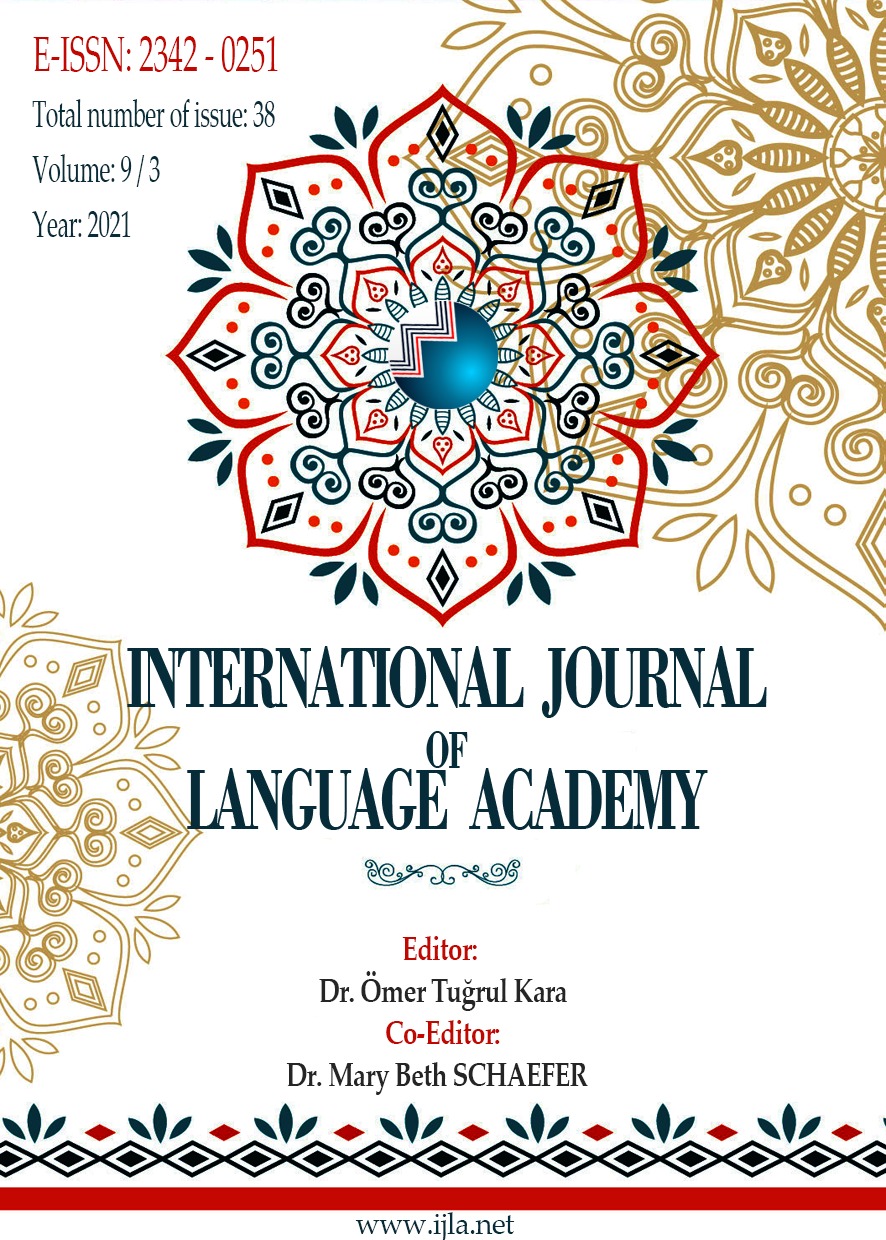Author :
Abstract
Bu çalışma, edebî romanda ünlem sözceleri ve göstergelerinin incelenmesine yöneliktir. Araştırma bütüncemiz 19. yüzyıl Fransız Edebiyatı klasiklerinden Doğalcılık (Natüralizm) akımına mensup Emile Zola’nın “La Confession de Claude” başlıklı eserinin Türkçe çevirisi olan “Claude’un İtirafları” romanıdır. Emile Zola’nın söyleminden hareket ederek bağlamsal dilbilim çerçevesinde metindeki ünlemsel sözceleri belirledikten sonra muhtemel ünlem göstergelerini mercek altına alacağız. Dilsel kullanım olarak “ünlem” deyince akla ister istemez konuşma dili gelmektedir. Öyle ki, söylem türü olarak ünlemsel sözceler sözlü dilin kendi iç dinamiğinde azımsanmayacak bir yere ve öneme sahiptir. Bu araştırmanın başlıca amacı şu temel soruyu aydınlatmaya çalışmaktır: Ünlemin edebî dildeki göstergeleri nelerdir ve nasıl yorumlanabilir? Bunun yanı sıra ünlem kullanımının geniş çapta yaygın olması, bütün dillerde insanın duygularını ifade etmek için dilsel ya da dil dışı unsurları kullanmaya ihtiyaç duyduğu gerçeği ile anlaşılmaktadır. Özellikle biçimsel parametrede sözce ve gösterge açısından yapısal olarak ünlemin sözcelemesi ve dışa vurumu olan dilsel ve dildışı göstergelerin temel unsur olduğu gösterilecektir. Bu çalışmayı gerçekleştirirken Batı Dilbilim alanında özellikle İngiliz ve Amerikan Dilbilim kuram ve yönteminden yararlanılacaktır. Diğer yandan, sözce ve gösterge analizinde ise Fransız Dilbilimi alanında güncel bir kuram olan “Sözceleme” (fr. énonciation/ing. enunciation) kuramından faydalanılacaktır.
Keywords
Abstract
This study focuses on examining exclamation utterances and signs in the literary novel. Our research corpus is "Claude's Confessions", the Turkish translation of "La Confession de Claude”, which is one of the 19th century French literature classics by Emile Zola, a member of Naturalism movement. Based on Emile Zola's discourse, after determining the exclamation utterances in the text within the framework of pragmatics we will examine the possible exclamation signs. Spoken language comes to mind when we say "exclamation" as a linguistic usage. Exclamation expressions have an important place and importance in the internal dynamics of spoken language. The main purpose of this research is to try to illuminate the following basic question: What are the signs of the exclamation in the literary language and how can it be interpreted? In addition, the widespread use of exclamation is understood by the fact that human beings need to use linguistic or non-linguistic elements to express their feelings in all languages. Especially in the formal parameter, it will be shown that linguistic and non-linguistic signs, which are the enunciation and expression of the exclamation, are the basic elements in terms of utterance and sign. While carrying out this study, in the field of Western Linguistics especially British and American linguistics theories and methods will be used. On the other hand, the theory of enunciation, which is a current theory in the field of French Linguistics, will be utilized for the utterance and sign analysis.
Keywords
- Akar, D. (1988). Some syntactic properties of Turkish interjections. Studies on Turkish Linguistics. 265-274. Ankara: METU Yayınları.
- Buran, A. (2008). Turkish Studies. Ankara: Turkish Studies Publication, Birinci Baskı.
- Büyükkantarcıoğlu, N. (2006). An analysis of Turkish interjections in the context of reactive idea framing”. Hacettepe Üniversitesi Edebiyat Fakültesi Dergisi, 23(1). Erişim tarihi: 25.05.2020, Erişim adresi: https://dergipark.org.tr/tr/pub/huefd/issue/41203/508443
- Chomsky, N. (2001). Dil ve Zihin (A. Kocaman, Çev.), Ankara: Ayraç Yayınevi.
- Crystal, D. (2008). A Dictionary of Linguistics and Phonetics, 6th ed. Oxford: Blackwell Publishers Ltd.
- Cevizci, A. (1999). Paradigma felsefe sözlüğü. İstanbul: Paradigma Yayınları.
- Damasio, A. (1995). Descartes’ Error. New York: 1st. ed. Avon.
- Descartes, R. (1955). Notes directed against certain programme. Translated by E.S. Haldane and G. T. Ross in The Philosophical Works of Descartes, Vol.Ⅰ New York: Dover (1645).
- Ergin, M. (1980). Türk Dil Bilgisi. İstanbul: Boğaziçi Yayınları, 5. Baskı.
- Ergene, O. (2013). Türkiye Türkçesinin ölçünlü dilinde kullanılan batı kökenli ünlemler. Ç.Ü. Sosyal Bilimler Enstitüsü Dergisi, 22(1), 43-60.
- Göksel, A. and Kerslake, C. (2005). Turkish: A comprehensive grammar. London: Routledge.
- Humboldt, W. (2008). On diversity of the human language construction and its influence on the mental development of human species. Çev.: Peter Health. Cambridge: Cambridge Press.
- İpek, B. (2018). Türkçede pekiştirme edatları. Avrasya Uluslararası Araştırmalar Dergisi, 6(13), 479-511. DOI: 10.33692/avrasyad.510260.
- Kant, I. (1984). Seçilmiş yazılar (N. Bozkurt, Çev.). İstanbul: Remzi Kitabevi.
- Külebi, O. (1990). Türkçe ünlemlerin kullanımbilim (pragmatics) yönünden incelenmesi. Dilbilim Araştırmaları Dergisi, 1, 10-35. Erişim tarihi: 25.05.2020, Erişim adresi: http://dad.boun.edu.tr/tr/issue/29234/312943.
- Leech, G. (1983). Principles of pragmatics. New York: Longman.
- Si, L. (2016). Research on linear instance of sentence function. Beijing: China Social Science Press.
- Türk Dil Kurumu Sözlükleri, Erişim tarihi: 20.05.2020, Erişim adresi: http://sözlük.gov.tr
- Vardar, B. (2002). Açıklamalı dilbilim terimleri sözlüğü. İstanbul: Multilingual Yayıncılık.
- Yılmaz, S. (2012). Emile Zola’nın La Confession de Claude başlıklı romanı ve Türkçe çevirisi üzerine karşılaştırmalı dil çeviri İncelemesi. Ⅷ. Ulusal Frankofoni Kongresi. Tekirdağ, Türkiye.
- Zola, E. (2011). Claude’un İtirafları (S. Yılmaz, Çev.). İstanbul: İdeal Kültür Yayıncılık (1909).
